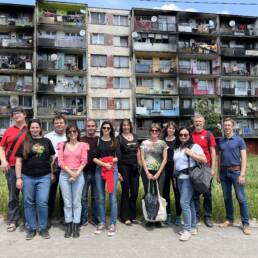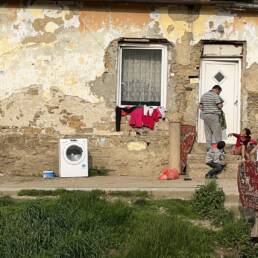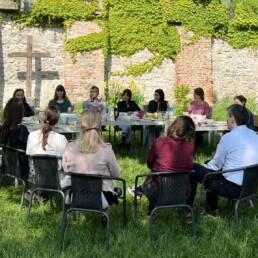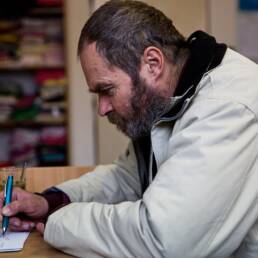Author
Anne Van Lancker
Policy Coordinator
European Minimum Income Network (EMIN)
As the economy is recovering, employment in many countries is rising. However, there are still 113 million people at risk of poverty and social exclusion; this is 15 million above the Europe 2020 ambitions that aimed at reducing poverty by at least 20 million people. In many countries, income poverty did not decrease at all.
To fight poverty, adequate Minimum Income benefits are indispensable. Denying people access to adequate Minimum Income benefits constitutes a violation of human rights.
To achieve the progressive realisation of the right to adequate Minimum Income Schemes, the past two years the European Minimum Income Network (EMIN) organised awareness raising activities amongst a broad audience and amongst politicians, to gradually improve policies on minimum income for people living in poverty. EMIN is a network of organisations, including public authorities, service providers, social partners, academics, policy makers at different levels, NGOs and people who (could) benefit from minimum income support. Lead partner in the project is EAPN and funding is provided by the European Commission based on an initiative by the European Parliament.
At the start of the project, all Member States had some kind of Minimum Income Scheme, including Italy and Greece, which recently introduced new schemes. But that does not mean that countries’ Minimum Income Scheme can be called decent. In recent years in some countries there have been some positive evolution in adequacy, accessibility and/or take-up; however, in many other countries the situation of minimum income beneficiaries has deteriorated.
Advocacy for decent Minimum Income Schemes consisted in building networks at EU and at national level, awareness raising through conferences, public events and an EU-wide bus journey, a communication strategy and policy advocacy toward EU institutions. There are good reasons to invest in adequate Minimum Income Schemes, not just for the people who need them, but for the whole of society.
Adequate Minimum Income Schemes ensure that people who need them can remain active in society and allow them to live in dignity. They are more likely to speed up integration into quality employment, while inadequate schemes can lock people in a cycle of dependency. They are indispensable to ensure social cohesion. Minimum Income Schemes represent a small percentage of social spending and have a high return on investment, while the cost of non-investment has negative impacts for individuals concerned and high long-term costs for society. As the basis for high quality social protection systems, they act as “economic stabilisers”: countries with high-quality social protection systems are better able to resist negative impacts of crises and to reduce inequalities. They are cost effective economic stimulus packages, as the money involved immediately re- enters the economy. Because of the interaction between benefits and wage levels, adequate Minimum Income Schemes play a positive role to help ensure decent wages and reverse the trend of rising numbers of “working poor” in Europe.
The EMIN activities focused on three characteristics essential to call Minimum Income Schemes decent: they should be adequate, accessible and enabling. Today, only a few countries are successful in delivering benefits at the level of adequacy, defined by the at-risk-of-poverty (AROP) threshold. Reference budgets are important tools to build consensus in society on what constitutes a decent life and to assess the adequacy of benefits as well as of the AROP threshold. Accessibility of benefits is a major problem in many countries and non-take-up is sometimes extremely high. Although all countries have developed activation strategies, these are not always contributing to an integrated, rights-based active inclusion of minimum income beneficiaries in the labour market and in society. EMIN organised peer review on these themes to formulate policy recommendations.
Activities in EMIN provided the backbone for an EU roadmap on the progressive realisation of adequate, accessible and enabling minimum income schemes.
The European Pillar of Social Rights can reinforce the existing policy framework on adequate minimum income at European level, if implemented through an ambitious roadmap, using all possible instruments to realise effective social rights. Post 2020, the European Semester should be transformed into a European Semester for Sustainable Development, with a new, more ambitious target based on a common % reduction in poverty, with social and environmental ambitions at the same level as economic objectives. EU funding should be targeted more strongly in support of the realisation of social rights. Finally, EMIN advocates the adoption of an EU framework directive on the right to a decent minimum income, to contribute to the realisation of an enforceable social right for all in Europe.
To ensure continuous commitment to “adequate minimum income benefits ensuring a life in dignity”, a European Observatory on Minimum Income should be created with the participation of all relevant actors, to ensure the knowledge developed on minimum income is captured to inform future work and to support, monitor and regularly report on developments in relation to Minimum Income Schemes.
About the author
Anne Van Lancker is policy coordinator for the European Minimum Income Network EMIN and research follow at RE-InVEST, a participatory research project on the importance of social investment for the realisation of human rights and capabilities. She has been active in politics as a member of the European Parliament (from 1994 to 2009), with special expertise in social and employment policies and human rights.












